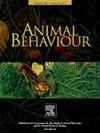Biological, social and ecological correlates of social play in immature Bwindi mountain gorillas, Gorilla beringei beringei
IF 2.1
2区 生物学
Q2 BEHAVIORAL SCIENCES
引用次数: 0
Abstract
Social play is a widespread behaviour in mammals, yet quantifying the proximate and ultimate costs and benefits of such play for immature individuals can be challenging. Here we assess how social play in Bwindi mountain gorillas varies with biological (age, sex, weaning status, mother parity), social (partner availability) and ecological factors (fruit consumption), while considering three nonmutually exclusive hypotheses for the function of play: the motor training, social relationship and energetic constraints hypotheses. We examine variation in social play in a data set representing over 6000 h of focal sampling of 33 immature Bwindi mountain gorillas (aged 0.6–8.0 years) spanning 18 years. We found that male and female mountain gorillas have different ontogenies of social play. Male gorillas played more than females, adhering to our prediction that males would be under stronger selection pressure than females to enhance development of social and motor skills. The rate of play per individual was also correlated with the number of other immature individuals present, suggesting that the development of certain skills may be linked to social opportunities for play. Furthermore, play rate was positively correlated with fruit consumption and weaning status, but not with a mother's parity, suggesting energetic constraints of play. Variation in social play in gorillas is consistent with predictions for both motor and social development functions and suggests that social play is under energetic constraints. Our results demonstrate that sex differences in immature play reflect sex differences in competition and affiliation as adults, suggesting that the costs and benefits of social play are not equal between the sexes.
幼龄布温迪山地大猩猩社会游戏的生物学、社会和生态学相关性
社交游戏在哺乳动物中是一种普遍的行为,但量化这种游戏对未成熟个体的直接和最终成本和收益可能具有挑战性。在此,我们评估了Bwindi山地大猩猩的社交游戏如何随生物因素(年龄、性别、断奶状态、母胎)、社会因素(伴侣可用性)和生态因素(水果消费)而变化,同时考虑了游戏功能的三个非互斥假设:运动训练、社会关系和能量约束假设。我们对33只未成熟的Bwindi山地大猩猩(0.6-8.0岁)进行了为期18年的超过6000小时的集中采样,研究了它们在社交游戏方面的差异。我们发现雄性和雌性山地大猩猩具有不同的社会游戏个体成因。雄性大猩猩比雌性大猩猩玩得更多,这与我们的预测一致,即雄性大猩猩会比雌性面临更大的选择压力,以提高社交和运动技能的发展。每个人的游戏率也与在场的其他不成熟个体的数量相关,这表明某些技能的发展可能与社交游戏机会有关。此外,玩耍率与水果消费量和断奶状态呈正相关,但与母亲的胎次无关,表明玩耍受到能量限制。大猩猩社交游戏的变化与运动和社交发展功能的预测一致,表明社交游戏是在能量限制下进行的。我们的研究结果表明,不成熟游戏中的性别差异反映了成年后竞争和从属关系的性别差异,这表明社会性游戏的成本和收益在两性之间并不相等。
本文章由计算机程序翻译,如有差异,请以英文原文为准。
求助全文
约1分钟内获得全文
求助全文
来源期刊

Animal Behaviour
生物-动物学
CiteScore
4.60
自引率
8.00%
发文量
236
审稿时长
10.2 weeks
期刊介绍:
Growing interest in behavioural biology and the international reputation of Animal Behaviour prompted an expansion to monthly publication in 1989. Animal Behaviour continues to be the journal of choice for biologists, ethologists, psychologists, physiologists, and veterinarians with an interest in the subject.
 求助内容:
求助内容: 应助结果提醒方式:
应助结果提醒方式:


